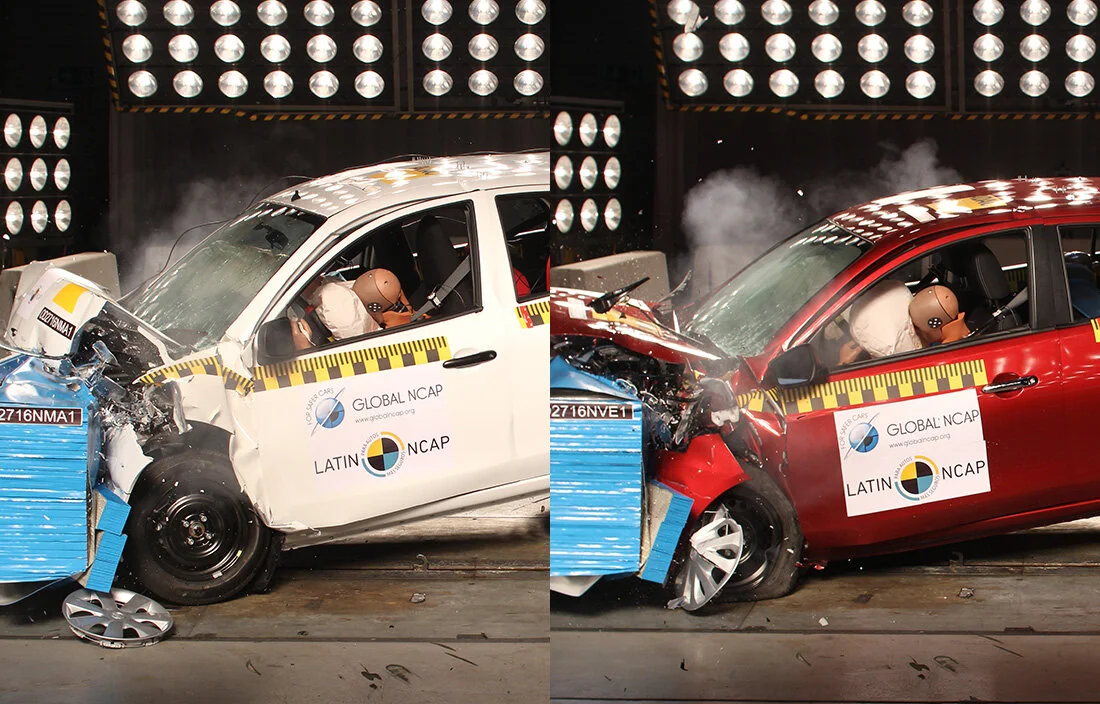Latin NCAP Demonstrates The Consequences Of Lack Of Safety Standards In The Region
Nissan March and Versa lose stars after audit test
The New Car Assessment Programme for Latin America and the Caribbean, Latin NCAP, has performed audit tests to two good selling models in the region: the Nissan March and Nissan Versa. The results of the audit tests show both models performing worse than in the original tests done in 2015 and narrowly reaching three stars for adult occupants.
Latin NCAP tested the two Nissan’s models in 2015, manufactured in Brazil and under the previous assessment protocol. The Nissan March achieved four stars for adult occupant and one star for child occupant protection. The Nissan Versa achieved by then four stars for adult occupant protection and two stars for child occupant protection. Nissan assured Latin NCAP that the versions of these models manufactured in Mexico are the same to the ones manufactured in Brazil.
However, Latin NCAP decided to perform audits tests to the versions manufactured in Mexico and both models offer less protection for adult occupants than the Brazilian versions and being tested under the same assessment protocol. Consequently, the ratings of both models were downgraded to three stars in adult occupant protection.
Q&A WITH ALEJANDRO FURAS, LATIN NCAP SECRETARY GENERAL
What are the main differences found in the performance of both models in comparison to the tests presented in 2015?
The main differences were found in the restrain systems and in the structure as both structures were rated as unstable and the ones tested in 2015 were rated as stable. The seatbelts in combination with airbags offered a lower protection level as both driver’s chests received weaker protection compared to the marginal and adequate protection offered in the 2015 tests.
What was Nissan’s reaction?
Latin NCAP asked Nissan to improve the audited cars to make them perform like in 2015 and achieve again four stars. Nissan explained that they are committed to study and understand the differences between both cars in order to achieve again four stars for adult occupant protection.
Are the March and Versa manufactured in Brazil still being produced as in 2015?
Latin NCAP has no evidence that Brazilian cars are still performing like in 2015. This case showed a poor production quality control by Nissan and lack of in depth knowledge to understand and solve these problems in advance. Considering that Nissan pointed in 2015 that Mexican and Brazilian cars are the same it is reasonable to understand that also the Brazilian versions could have drop the performance.
Whose responsibility is it and is there any way this could be prevented?
Monitoring to prevent these kind of changes in production quality are the responsibility of the manufacturer but policed by governments that should apply proper regulations. Latin NCAP and Global NCAP recently showed the enormous potential of applying UN’s minimum crash test standards in relation to lives, serious injuries and social costs that could be saved. These regulations also provide strong administrative framework and strict control of production to manufacturers. Once again, we urge all governments across the region to implement them immediately.
About Latin NCAP
The Latin New Car Assessment Programme (Latin NCAP) was launched in 2010 to develop a regional system of independent crashworthiness and safety rating across Latin America and Caribbean (LAC). Latin NCAP replicates similar consumer testing programmes developed over the last thirty years in North America, Europe, Asia and Australia, and which have proved to be very effective in improving the safety of motor vehicles. Since 2010 Latin NCAP has published the results of more than seventy car models in seven test phases.
Latin NCAP acknowledges the support received by the Global New Car Assessment Programme (Global NCAP), International Consumer Research and Testing (ICRT), FIA Foundation, the Inter-American Development Bank (IADB) and Bloomberg Philanthropies Global Road Safety Initiative.
Latin NCAP is an Associate member of Global NCAP and supports the United Nations Decade of Action for Road Safety 2011-2020 and the Stop the Crash Partnership.
More info: www.latinncap.com





